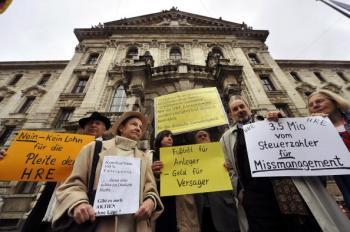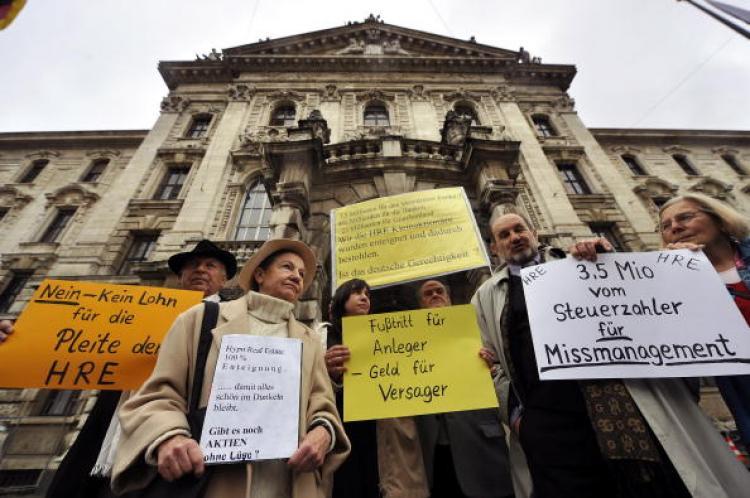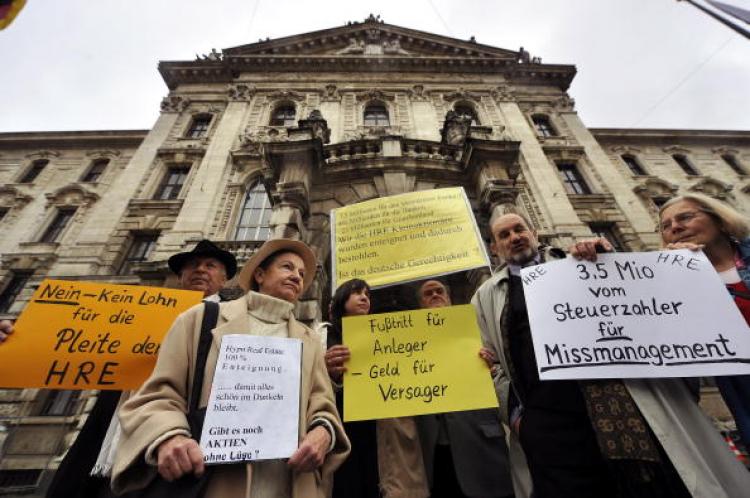Seven of the 91 European Union banks subject to financial industry stress testing failed, according to EU regulators on Friday.
While the fact that an overwhelmingly high proportion of banks passed muster boosted investor confidence, the low rate of failure nevertheless stirred concerns that the tests may have been too lenient.
The banks to flunk the test include Hypo Real Estate Holding AG of Germany, Agriculture Bank of Greece SA, and five small lenders in Spain. The tests, which measure a bank’s Tier 1 capital, simulates the event of a new recession as well as a possible crisis in European government bonds. Tier 1 capital is a measurement of a bank’s financial strength, and including common stock and reserves.
National regulators are “in close contact with the banks in question to assess the results of the test and their implications, in particular any potential need for recapitalization,” read a statement from the European Central Bank (ECB).
Hypo Real Estate, the German commercial real-estate lender, had a 4.7 percent capital ratio in the test’s most stressful scenario, according to BaFin, Germany’s financial industry regulator. Hypo was subject to a German government bailout at the height of the financial crisis.
None of the major EU banking institutions—such as the U.K.’s Royal Bank of Scotland and Barclays Plc, Germany’s Deutsche Bank AG, or France’s BNP Paribas SA—were close to failing the test.
“The outcome of the stress testing exercise should not be seen as a precise forecast of the expected future outcomes of a bank,” the ECB said. “Rather, the scenarios are designed as ‘what- if’ scenarios including plausible but extreme assumptions, which are therefore not likely to materialize.”
The most stressful scenario measured how banks fared under a moderate recession starting this year, with severe losses on government bonds. None of the stress scenarios simulated a debt default by a European nation, such as Greece, leading some economists to say that the tests were not stringent enough.
“There is little evidence that the tests have been applied consistently and there is a distinct lack of credibility, making this a wasted opportunity,” Richard Cranfield of Allen & Overy said in a Reuters interview.
Similar tests carried out last year in the United States found Citigroup Inc. and Bank of America Corp. needing additional capital.
While the fact that an overwhelmingly high proportion of banks passed muster boosted investor confidence, the low rate of failure nevertheless stirred concerns that the tests may have been too lenient.
The banks to flunk the test include Hypo Real Estate Holding AG of Germany, Agriculture Bank of Greece SA, and five small lenders in Spain. The tests, which measure a bank’s Tier 1 capital, simulates the event of a new recession as well as a possible crisis in European government bonds. Tier 1 capital is a measurement of a bank’s financial strength, and including common stock and reserves.
National regulators are “in close contact with the banks in question to assess the results of the test and their implications, in particular any potential need for recapitalization,” read a statement from the European Central Bank (ECB).
Hypo Real Estate, the German commercial real-estate lender, had a 4.7 percent capital ratio in the test’s most stressful scenario, according to BaFin, Germany’s financial industry regulator. Hypo was subject to a German government bailout at the height of the financial crisis.
None of the major EU banking institutions—such as the U.K.’s Royal Bank of Scotland and Barclays Plc, Germany’s Deutsche Bank AG, or France’s BNP Paribas SA—were close to failing the test.
“The outcome of the stress testing exercise should not be seen as a precise forecast of the expected future outcomes of a bank,” the ECB said. “Rather, the scenarios are designed as ‘what- if’ scenarios including plausible but extreme assumptions, which are therefore not likely to materialize.”
The most stressful scenario measured how banks fared under a moderate recession starting this year, with severe losses on government bonds. None of the stress scenarios simulated a debt default by a European nation, such as Greece, leading some economists to say that the tests were not stringent enough.
“There is little evidence that the tests have been applied consistently and there is a distinct lack of credibility, making this a wasted opportunity,” Richard Cranfield of Allen & Overy said in a Reuters interview.
Similar tests carried out last year in the United States found Citigroup Inc. and Bank of America Corp. needing additional capital.






